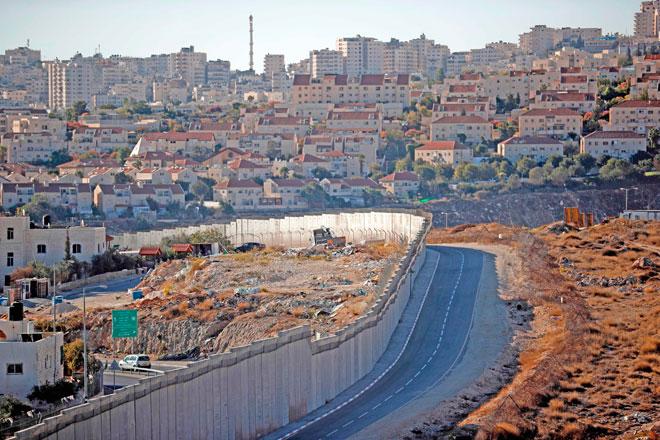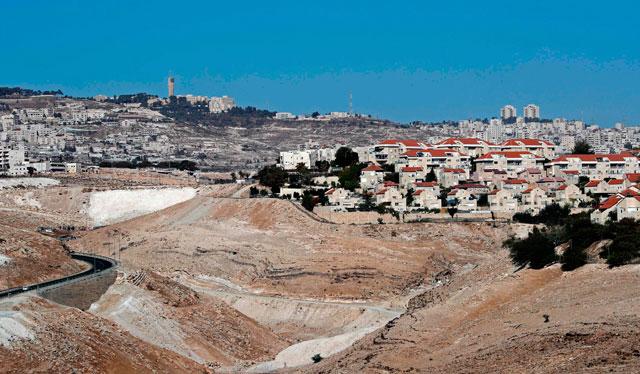You are here
Israel 'annexation' bill draws fresh concern for two-state solution
By AFP - Oct 26,2017 - Last updated at Oct 26,2017

Israel's controversial separation barrier is seen dividing Jerusalem (background) from the West Bank town of Hizma (left), on Thursaday (AFP photo)
OCCUPIED JERUSALEM — A bill that critics say would amount to de facto annexation of Israeli settlements surrounding Jerusalem is expected to go before ministers on Sunday, drawing harsh criticism from Palestinians and those hoping to salvage the two-state solution.
The bill would absorb major Israeli settlements currently in the occupied West Bank into Jerusalem by enlarging the city limits.
Its opponents argue that it is a step towards full unilateral annexation of the West Bank settlements affected — a move that would be sure to spark international outrage.
For the vast majority of the international community, the status of Israel's settlements, built on land the Palestinians see as part of their future state, are to be decided in peace negotiations.
Approval by a ministerial committee on Sunday would fast-track the bill’s progress through parliament.
“This coming Sunday I shall take part in Jewish history,” Intelligence Minister Yisrael Katz posted on Facebook Wednesday.
“The ‘Greater Jerusalem bill’, which I initiated, will come up for a vote in the ministerial committee on legislation,” he said.
Senior Palestinian official Hanan Ashrawi said the plan could kill hopes for an independent Palestinian state.
Ashrawi, a member of the Palestine Liberation Organisation’s executive committee, said late Wednesday that “such efforts represent the end of the two-state solution”.
“Israel is in the business of prolonging the military occupation and not ending it, legalising the presence of extremist Jewish settlers on Palestinian soil, and completing the total isolation and annexation of Palestinian Jerusalem,” she wrote.
‘We shall build here’
Israel occupied the West Bank, including East Jerusalem, in the June War of 1967. It later annexed east Jerusalem in a move never recognised by the international community.
It sees the entire city as its indivisible capital, while the Palestinians want the eastern sector as the capital of their future state.
Prominent members of Netanyahu’s coalition openly oppose the idea of a Palestinian state and advocate annexing most of the West Bank.
The major settlement of Maaleh Adumim, east of Jerusalem, would be among the areas absorbed into the enlarged city limits under the draft legislation, according to an explanatory note by its sponsors.
The settlements mentioned however would not be fully annexed to Israel — at least not at first — although Netanyahu pledged on a recent visit to Maaleh Adumim that it would at some part become part of Israel.
“We shall build here thousands of settler units” and add industrial zones, Netanyahu said during his visit to the settlement of 37,000 people. “This place will be a part of the state of Israel.”
Maaleh Adumim’s municipal boundaries include a contentious area known as E1 adjacent to the settlement.
E1 and Maaleh Adumim form an Israeli buffer east of Jerusalem that the Palestinians say would divide the city from the West Bank and badly hurt the possibility of a contiguous Palestinian state.
Also incorporated under the new bill would be the ultra-Orthodox Jewish settlement of Beitar Illit, southwest of Jerusalem, the Gush Etzion settlement bloc to the south and Efrat and Givat Zeev settlements.
“The settlements joined to Jerusalem will maintain certain municipal autonomy, since they will be considered sub-municipalities of Jerusalem,” the draft bill says.
Katz said the bill would add an additional 150,000 people to Jerusalem’s population, strengthening its Jewish majority.
‘De-facto annexation’
Haaretz newspaper on Thursday said the wording meant the settlements would be annexed to the city of Jerusalem rather than to the state of Israel.
But settlement watchdog Peace Now said any difference was purely cosmetic.
“The meaning of the bill is a de-facto annexation of these territories to Israel, even if it would be possible to argue that this will not constitute de-jure annexation,” it said in a statement.
Daniel Seidemann, head of the Terrestrial Jerusalem group, which monitors Israel’s settlements and its treatment of Palestinians in East Jerusalem, said that Netanyahu had backed a similar plan in 1998 but was forced to abandon it by international condemnation.
Now, with a supportive US President Donald Trump, Netanyahu apparently feels more confident, Seidemann told AFP on Thursday.
Netanyahu heads what is seen as the most right-wing government in Israel’s history, and settlement advocates wield significant power in his coalition.
“This is part of an overall attempt to implement policies that are tantamount to de facto annexation and it’s also an indication that Netanyahu thinks he can get away with anything,” Seidemann said.
Related Articles
OCCUPIED JERUSALEM — US President Donald Trump's administration opposed a planned vote on a controversial Israeli bill that critics say woul
OCCUPIED JERUSALEM — The Jewish settler population of the Israeli-occupied West Bank grew by 3 per cent to 448,672 in 2018, the main organis
Israel Prime Minister Benjamin Netanyahu has told US Secretary of State John Kerry that he wants to annex a fourth bloc of West Bank settlements, army radio reported on Sunday.

















